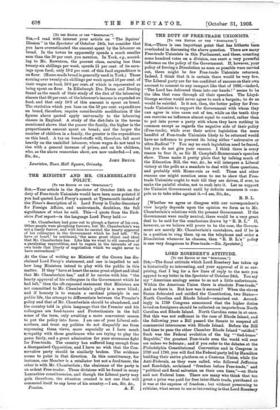[To THE EDITOR OF THE "SPECTATOR. "] SIR,—I read with interest
your article on " The Squires' Illusion" in the Spectator of October 24th, but consider that you have overestimated the amount spent by the labourer on bread. In the towns he apparently spends a much smaller sum than the 50 per cent. you mention. In York, e.g., accord- ing to Mr. Rowntree, the poorest class, earning less than twenty-six shillings per week, spends 51 per cent. of its earn- ings upon food; only 18-2 per cent. of this food expenditure is on flour. (Home-made bread is generally used in York.) Those earning over twenty-six shillings per week spend 58 per cent. of their wages on food, 16.8 per cent. of which is represented as being spent on flour. In Edinburgh Drs. Paton and Dunlop found as the result of their study of the diet of the labouring classes that 68 per cent. of the labourer's income is expended on food, and that only 19.3 of this amount is spent on bread. The statistics which you base on the 50 per cent. expenditure on bread, therefore, require considerable modification if the figures above quoted apply universally to the labouring classes in England. A study of the diet-lists in the towns mentioned shows that the poorer the family, the higher is the proportionate amount spent on bread; and the larger the number of children in a family, the greater is the expenditure on this head. A tax on bread-stuffs will, therefore, fall most heavily on the unskilled labourer, whose wages do not tend to rise with a general increase of prices, and on his children, who, as the above researches show, are now underfed.—I am, Sir, &c.,
JOHN BRUCE.
Lauriston, Town Hall Square, Grimsby.


















































 Previous page
Previous page